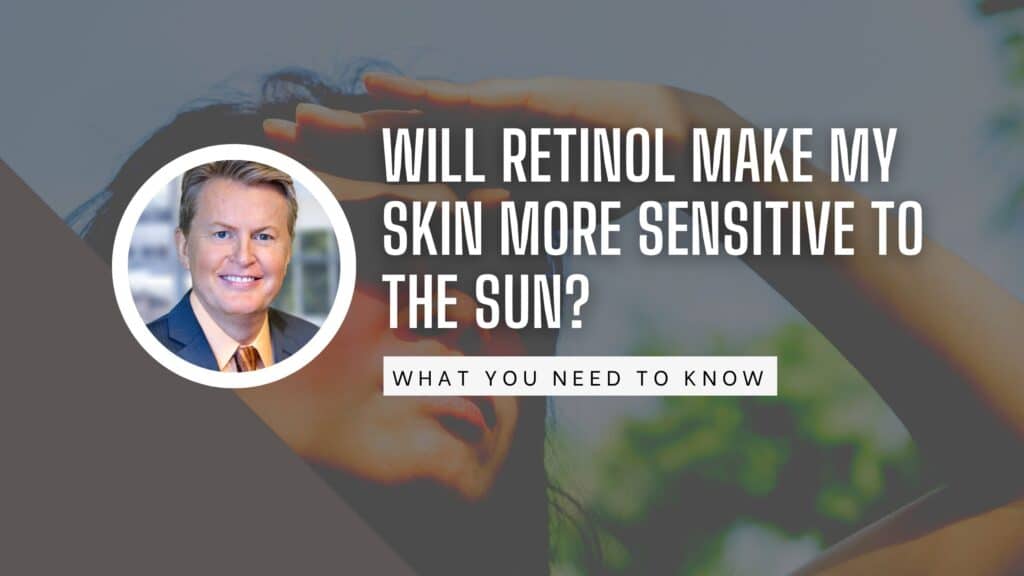Summary:
- Retinol is derived from vitamin A. It is highly regarded in skincare for its benefits. These include improving skin texture, reducing wrinkles, and promoting a youthful complexion.
- Retinol itself does not cause sun sensitivity. However, it can contribute indirectly to photosensitivity. This is because retinol has exfoliating and renewing properties.
- Retinol causes skin cells to shed, revealing new and more delicate skin. This skin may be more vulnerable to the damaging effects of UV rays.
- To minimize the potential risks of sun sensitivity when using retinol, it is important to apply broad-spectrum sunscreen, limit sun exposure during peak hours, and wear protective clothing.
What is Retinol
Retinol is derived from vitamin A. It has achieved a reputation as a “holy grail” in skincare. Its remarkable properties make it a must-have for many. It can improve skin texture, reduce wrinkles, and promote a youthful complexion.
However, one concern that often arises among skincare enthusiasts is whether retinol can make the skin more sensitive to the sun. Retinol is becoming more popular. It is important to understand how it impacts sun sensitivity. This will help us keep our skin healthy and protected.
When applied topically, Retinol works by increasing cell turnover and stimulating collagen production, leading to smoother and more radiant skin. While it offers numerous benefits, its potential impact on sun sensitivity requires careful consideration. The concern about retinol stems from its ability to cause skin reactions.
These include increased exfoliation and the shedding of dead skin cells. This reveals fresher, more delicate skin underneath. The new skin may not be as effective in blocking out the sun’s UV rays. Therefore, it is more vulnerable to the damaging effects of the sun.
Understanding the relationship between retinol and sun sensitivity is essential to establish an effective skincare routine. While retinol does not inherently increase the skin’s sensitivity to the sun, it can indirectly contribute to photosensitivity. This article will explore the risks of retinol and sun exposure. We will also provide valuable insights and precautions to help you keep your skin healthy and protected while using retinol.
Understanding Retinol:
Retinol is a form of vitamin A widely used in skincare products for its potential benefits. It is known to improve skin texture, reduce the appearance of fine lines and wrinkles, and promote a more youthful complexion. When applied topically, retinol stimulates collagen production and increases cell turnover, resulting in smoother and more radiant skin.
However, it is essential to note that retinol can also have some potential side effects. These may include skin irritation, redness, dryness, and flaking. These reactions are often temporary and can be managed by adjusting the frequency and concentration of retinol. It is advisable to start with a lower concentration and gradually increase over time to allow the skin to adapt.
It is worth noting that retinol itself does not directly make the skin more sensitive to the sun. However, its exfoliating and renewing properties can make the skin more vulnerable to the harmful effects of UV radiation.
It is essential to protect your skin when using retinol. Take these measures:
-Apply a broad-spectrum sunscreen with a high SPF
-Wear protective clothing
-Limit sun exposure during peak hours
Understanding how retinol works can help you make informed decisions about using it in your skincare routine. It is important to be aware of possible side effects.
Consulting a skincare professional like Mentor Plastic Surgery & MedSpa is recommended for personalized advice and guidance. They can assess your skin’s needs and provide tailored recommendations. This will help you achieve the best results while protecting your skin.
Click here to watch a video from the American Society of Plastic Surgeons explaining retinol use.
Photosensitivity and Retinol:
Photosensitivity refers to increased skin sensitivity to sunlight and its harmful ultraviolet (UV) rays. Retinol does not cause photosensitivity, but it can lead to skin reactions. This can make your skin more vulnerable to sun damage.
It is important to remember that retinol-induced photosensitivity can vary from one person to another. This is because everyone’s skin type and sensitivity levels are unique.Retinol increases the rate at which skin cells renew. This causes old, dead cells to be shed. New skin is revealed in its place, which is more delicate.
This fresh skin may have a reduced barrier function, making it more prone to sunburn and other sun-related issues.
It is essential to note that the extent of photosensitivity caused by retinol varies. This is due to individual skin types and sensitivities. The skin’s reaction to the sun can be affected by different factors. These include the concentration and frequency of retinol use and other skincare products used alongside it.
It is crucial to take necessary precautions to minimize the potential risks associated with sun sensitivity when using retinol. Wear sunscreen with a broad-spectrum SPF of 30 or higher. Apply it generously to all exposed areas of the skin. Reapply it regularly, especially if you are in direct sunlight for extended periods.
Limiting sun exposure during peak hours, seeking shade, and wearing protective clothing, hats, and sunglasses can help protect against UV rays. These precautions can provide an extra layer of defense.
Retinol can provide many skin benefits. However, it is important to be aware of its effect on sun sensitivity. Too much sun exposure can cause skin damage when using retinol. Therefore, caution should be taken when using this product.
Follow sun protection measures. Seek guidance from skincare professionals, such as those at Mentor Plastic Surgery & MedSpa. You can safely incorporate retinol into your skincare routine. This will maintain the health and vitality of your skin.
Retinol increases the rate of skin cell replacement. Dead skin cells are shed when new skin appears. This new skin is more delicate. It is important to maintain a balanced approach to skincare. Make sure to reap the rewards of effective ingredients.
Sun safety should be a priority for long-term skin health.
Precautions to Minimize Sun Sensitivity:
To mitigate the potential risks associated with sun sensitivity when using retinol, it is crucial to follow these precautions:
- Apply Sunscreen: Make sunscreen with a broad-spectrum SPF of 30 or higher, an integral part of your skincare routine. Apply it generously and reapply every two hours, especially when spending prolonged periods in direct sunlight.
- Limit Sun Exposure: Minimize your exposure, particularly during peak hours when the sun’s rays are the strongest. Seek shade, wear protective clothing, and use accessories such as hats and sunglasses to shield your skin from harmful UV rays.
- Gradual Introduction: Start with a low concentration of retinol and gradually increase its usage to allow your skin to acclimate. Begin by applying retinol every other day and observe how your skin responds before incorporating it into your daily routine.
- Nighttime Application: Apply retinol products before bedtime to minimize exposure to sunlight. This allows the product to work effectively without the risk of sun sensitivity during the day.
It is recommended to consult with a skincare professional for optimal results and personalized advice. Consider consulting with professionals at Mentor Plastic Surgery & MedSpa.
Skin care professionals can assess your skin’s individual needs. They can recommend the right retinol products. Lastly, they can offer sun protection advice based on your individual situation.
Retinol can be a game-changer in your skincare routine. Still, it is essential to understand the potential risks and take necessary precautions to protect your skin from sun damage. Mentor Plastic Surgery & MedSpa can expertly guide you to include retinol in your skin care routine. This will help keep your skin healthy and glowing.
Remember, a mindful approach to skincare is the key to achieving a beautiful, youthful complexion while maintaining skin health and vitality.
Schedule your consultation with Dr. Vanek today to learn more about the benefits of this product.


